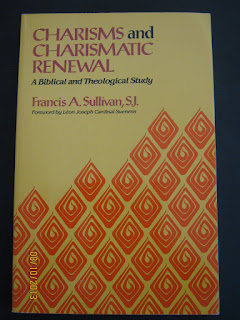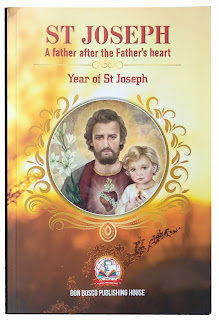Charisms and Charismatic Renewal (Book Review)
Francis Sullivan, Charisms and Charismatic Renewal, Dublin: Gill and Macmillan 1982, ISBN 0 7171 1237 3, pp. 184, Cost not mentioned.
The Charismatic Renewal took the
Church by storm. Its rapid growth excited many but also raised a lot of
eyebrows regarding its authenticity and theological uprightness. While droves
of people happily embraced it as a refreshing change from ‘dry’ liturgical or
para-liturgical celebrations, other were quite uncertain and suspicious about
the whole affair.
Fr Sullivan’s work, in the words of
Cardinal Suenens “comes at the right time”. Though it may be old now, its ideas
are still pertinent and arguments relevant. Fr Sulilvan is/was a professor of
dogmatic theology at the Gregorian University in Rome and has systematically
and in scholarly fashion subjected the charismatic renewal to the theological
lens of scrutiny. He presents a brief history of the movement but offers more
in terms of its theological and scriptural base, its impact on the Church at
that time and its possibilities in the future. We, today, are in a better
position to evaluate the last point but have lots to learn from Fr Sullivan’s
analysis and insights.
The book isn’t very large and has
nine chapters. Right at the outset one can perceive that Fr Sullivan is out to
clarify misguided ideas or concepts of the movement by people within and without
it. His tone is quite didactic but the language is simple and easy-to-follow. The
presentation overall appears rather neutral and reveals the author’s
theological stance.
 Chapter one is a short but
foundational chapter that clarifies the concepts of ‘charism’ and ‘charismatic
renewal’. Charism basically means “special grace”. This grace is a gift from
God and is not to be confused with one’s natural gifts and talents, even though
they too are gifts from God. The idea of charism is well brought out in the
teaching of Vatican II. It relies on a strong tradition and scriptural
foundations. Since St Paul teaches extensively about Charisms, an in-depth
analysis of his teachings is necessitated and therefore forms the core of
chapter two.
Chapter one is a short but
foundational chapter that clarifies the concepts of ‘charism’ and ‘charismatic
renewal’. Charism basically means “special grace”. This grace is a gift from
God and is not to be confused with one’s natural gifts and talents, even though
they too are gifts from God. The idea of charism is well brought out in the
teaching of Vatican II. It relies on a strong tradition and scriptural
foundations. Since St Paul teaches extensively about Charisms, an in-depth
analysis of his teachings is necessitated and therefore forms the core of
chapter two.
The second chapter is an important
and very insightful chapter. The Greek and Latin can get a little overbearing
but understanding them is key to grasping the key insights and developing a
sound knowledge of the matter. Chapter three delves into the lists of charisms
given by Paul in his epistles. Each one is dealt with carefully so as to foster
a comprehensive background of charisms within the Christian and more
specifically, biblical context. Chapter four examines various forms the
charismatic renewal has taken and is more of a historical reconstruction and
analysis.
Chapters five, seven, eight and nine
deal with core ideas of the charismatic renewal, namely, ‘Baptism in the Spirit’,
‘Prophecy’, ‘The Gift of Tongues’ and ‘Charisms of Healing’. These are words
one is sure to hear within the context of the charismatic renewal and Fr
Sullivan offers a brilliant analysis from the theological and biblical
viewpoints. He adroitly clarifies the various ideas connected with these gifts
and seeks to offer a Catholic understanding and approach to them.
In the midst of these, a chapter on
Charismatic Renewal stands out like blood stain on a white sheet. This chapter
could have preceded the chapter on ‘Baptism in the Spirit’ or concluded the
book as its last chapter since it seeks to understand the composition and
ideology of the movement. There are a number of beautiful insights to be gained
from the book and I highly recommend it for anybody interested in knowing the
movement. The book is educative in as much as it not only gives new knowledge
or insights but also clarifies misconceptions. Those suspicious or downright
opponents of the movement will also stand to gain from the book since it
lucidly elaborates the biblical and neo-theological foundations of the movement.


Comments
Post a Comment